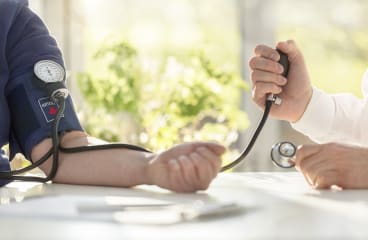
Overview
Blood pressure is a measure of how hard blood pushes against the walls of your arteries as it moves through your body. Low blood pressure is also called hypotension. It means that your blood pressure is much lower than normal. Some people may have slightly low blood pressure without symptoms. But in many people, low blood pressure can make you feel dizzy or lightheaded. When your blood pressure is too low, your heart, brain, and other organs do not get enough blood.
Low blood pressure can be caused by many things, including heart problems and some medicines. Diabetes that is not under control can cause your blood pressure to drop. And so can a severe allergic reaction or infection. Another cause is dehydration, which is when your body loses too much fluid.
Treatment for low blood pressure depends on the cause.
Follow-up care is a key part of your treatment and safety. Be sure to make and go to all appointments, and call your doctor if you are having problems. It's also a good idea to know your test results and keep a list of the medicines you take.
How can you care for yourself at home?
- Be safe with medicines. Call your doctor if you think you are having a problem with your medicine. You will get more details on the specific medicines your doctor prescribes.
- If you feel dizzy or lightheaded, sit down or lie down for a few minutes. Or you can sit down and put your head between your knees. This will help your blood pressure go back to normal and help your symptoms go away.
- Follow your doctor's suggestions for ways to prevent symptoms like dizziness. These suggestions may include:
- Get up slowly from bed or after sitting for a long time. If you are in bed, roll to your side and swing your legs over the edge of the bed and onto the floor. Push your body up to a sitting position. Wait for a while before you slowly stand up.
- Add more salt to your diet, if your doctor recommends it.
- Drink plenty of fluids. Choose water and other clear liquids. If you have kidney, heart, or liver disease and have to limit fluids, talk with your doctor before you increase the amount of fluids you drink.
- Avoid or limit alcohol to 2 drinks a day for men and 1 drink a day for women. Alcohol may interfere with your medicine. In addition, alcohol can make your low blood pressure worse by causing your body to lose water.
- Wear compression stockings to help improve blood flow.
When should you call for help?
Call 911 anytime you think you may need emergency care. For example, call if:
- You passed out (lost consciousness).
Call your doctor now or seek immediate medical care if:
- You are dizzy or lightheaded, or you feel like you may faint.
Watch closely for changes in your health, and be sure to contact your doctor if you have any problems.
Where can you learn more?
Go to http://www.healthwise.net/patientEd
Enter C304 in the search box to learn more about "Low Blood Pressure: Care Instructions".
Current as of: October 2, 2025
Author: Ignite Healthwise, LLC Staff
Clinical Review Board
All Ignite Healthwise, LLC education is reviewed by a team that includes physicians, nurses, advanced practitioners, registered dieticians, and other healthcare professionals.

